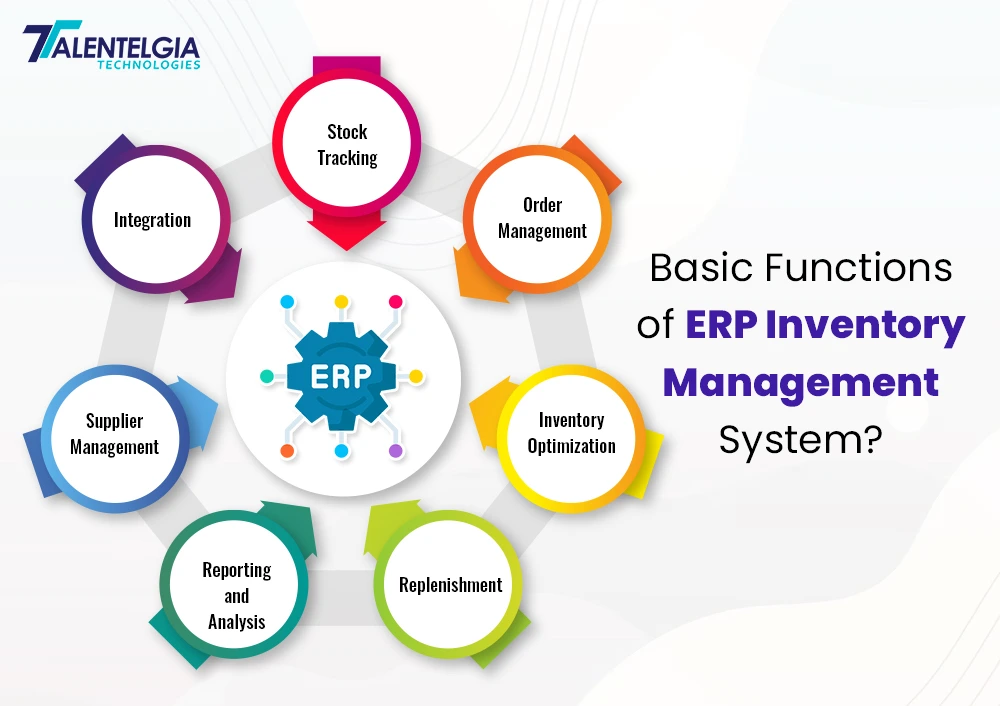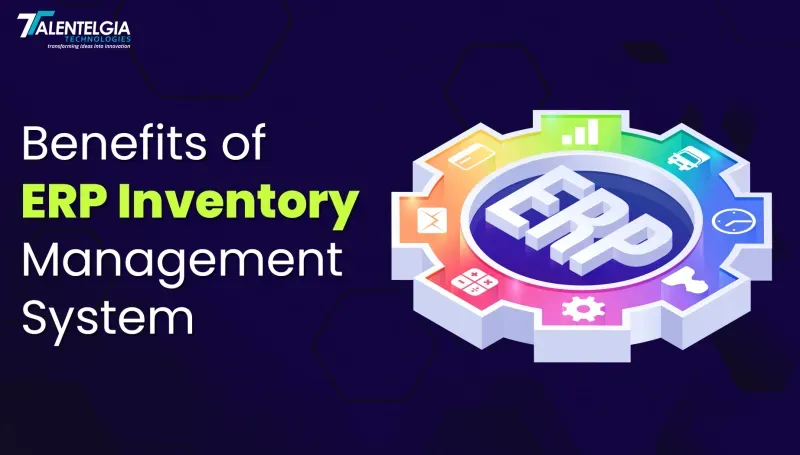As business expands, It gets really difficult to manage inventory and orders manually. Hence, many businesses opt for an ERP inventory management system. They help to control and manage all processes, managing stock providing reports, tracking, and even smart stocking locations to improve picking and packing.
Discover the transformative power of ERP inventory management systems in revolutionizing businesses, streamlining operations, and fostering adaptability in an ever-evolving market.
Uncover the key insights that propel enterprises towards growth and innovation, making the case for embracing ERP solutions in the pursuit of organizational excellence.
What is an ERP Inventory Management System?
To understand ERP Development Services, we need first to understand what an ERP is. ERP, which means enterprise resource planning, is software designed to integrate and streamline various aspects of business operations with a unified platform. It acts as a central nervous system for an organization, bringing together different departments, processes, and data into a single, cohesive system.
ERP provides the right inventory information to the businesses, so they can make smarter choices helping you to manage finances, logistics, and inventory all in one place. Before using ERP, most businesses check and compare the inventory features of different ERP System. This helps them to eliminate errors and work more effectively.
ERP inventory management tools include SAP S/4HANA, Oracle Netsuite, and Microsoft Dynamics 365.
According to Statista, the Enterprise Resource Planning Software market is anticipated to achieve a revenue milestone of US$49.38 billion by 2023. Furthermore, it is forecasted to display a yearly growth rate (CAGR 2023-2028) of 4.78%, ultimately reaching a market volume of US$62.36 billion by 2028.
Basic Functions of ERP Inventory Management System
Let’s take a closer look at the features of the ERP Inventory Management System and see how it works to make a company’s inventory tasks better and more organized.

Benefits of ERP Inventory Management System
Using an ERP Inventory Management System offers several advantages for businesses. It is a helpful tool that simplifies managing items in a store. The right system can greatly help to improve your organization’s profitability by improving your forecasting, organizing your inventory, and reducing transportation time and carrying costs. It also ensures sending out orders quicker and more exact, keeping customers satisfied.
Let’s explore how it improves the smooth and efficient operation of businesses.
1. Tracks Inventory in Real-time
An ERP inventory management system helps to keep track of your inventory in real-time. It automatically updates – what you have in stock to match your actual inventory demand. When you don’t have real-time tracking, your team might not update the inventory data until later, maybe waiting to do it all at once. This means the inventory information doesn’t match what’s really in stock until they finish this task. And if you have several places storing inventory, it gets even more tricky to keep it all in sync.
An ERP Inventory Management System Helps:
- It cuts down on items out of stock, unused stock, and avoidable returns.
- It greatly enhances order accuracy and delivery precision, consequently lowering return rates.
- Provides better insight into your inventory, improving how accurately you predict what you’ll need and report other important details.
2. Increased Accuracy
ERP’s have an inventory management tool which is very effective. It tells you exactly how much inventory you have. As a result, you always know when you’re running low on items and can restock before they run out. This timely update enables businesses to operate based on real-time information, reducing discrepancies between recorded data and what’s physically available.
By maintaining accurate stock records, businesses can avoid situations such as overselling products or failing to meet customer orders due to inaccurate inventory data.
3. Automated Workflow
It is important to keep your employees free from doing manual tasks to get more stuff done accurately. An automated system helps your business manage all your stock. It also helps your organization reduce repeating data, running out of stock, keeping old items, and having too much inventory.
Automated systems can help to:
- Minimize Data Duplication: Having the same data in many spots can mess things up, can be expensive, and make things confusing.
- Increase Speed, Efficiency, and Accessibility: Automated inventory management quickly swaps out old items with new ones and sends automatic alerts for items on backorder, along with real-time restocking reports.
- Prevent running out of stock: Improve customer happiness by delivering orders on time.
4. Data Security

There are two ways to set up and ERP – On-premises and the Cloud. However, cloud-based software has become super popular because it keeps your data safe and it’s easier on your budget. Doing inventory by hand might means using programs like Excel saved on your computer’s hard drive, but that doesn’t give you the security and flexibility you’ will get from an ERP system with cloud backup.
5. Better Identification of Products
Depending on what products you sell, using numbers or codes to identify products is a great way to organize your inventory better. Retailers commonly use SKU numbers to track products and track their movement.
For instance, you might find a Medium Fall Green T-Shirt labeled as MFALLGR-SHIRT. In industries like Food and beverage or Pharmaceuticals, serial and lot numbers are often used. This helps keep a close eye on product movement. These codes are crucial to avoid items expiring and to catch any unauthorized products. Especially during product recalls, lots/batches become super important because you can pinpoint which supplier the product is from and who bought it.
Conclusion
In conclusion, ERP Development Services is a strategic ally for businesses navigating the complexities of inventory control. Beyond efficient stock tracking and order management, its contributions extend to real-time accuracy, automated workflows, data security, and enhanced product identification.
Embracing ERP solutions empowers businesses to not only streamline operations but also adapt and innovate in a dynamic market. The transformative benefits of ERP systems solidify their role as catalysts for growth, enabling organizations to thrive amidst evolving challenges and opportunities.


 Healthcare App Development Services
Healthcare App Development Services
 Real Estate Web Development Services
Real Estate Web Development Services
 E-Commerce App Development Services
E-Commerce App Development Services E-Commerce Web Development Services
E-Commerce Web Development Services Blockchain E-commerce Development Company
Blockchain E-commerce Development Company
 Fintech App Development Services
Fintech App Development Services Fintech Web Development
Fintech Web Development Blockchain Fintech Development Company
Blockchain Fintech Development Company
 E-Learning App Development Services
E-Learning App Development Services
 Restaurant App Development Company
Restaurant App Development Company
 Mobile Game Development Company
Mobile Game Development Company
 Travel App Development Company
Travel App Development Company
 Automotive Web Design
Automotive Web Design
 AI Traffic Management System
AI Traffic Management System
 AI Inventory Management Software
AI Inventory Management Software
 AI Software Development
AI Software Development  AI Development Company
AI Development Company  AI App Development Services
AI App Development Services  ChatGPT integration services
ChatGPT integration services  AI Integration Services
AI Integration Services  Generative AI Development Services
Generative AI Development Services  Natural Language Processing Company
Natural Language Processing Company Machine Learning Development
Machine Learning Development  Machine learning consulting services
Machine learning consulting services  Blockchain Development
Blockchain Development  Blockchain Software Development
Blockchain Software Development  Smart Contract Development Company
Smart Contract Development Company  NFT Marketplace Development Services
NFT Marketplace Development Services  Asset Tokenization Company
Asset Tokenization Company DeFi Wallet Development Company
DeFi Wallet Development Company Mobile App Development
Mobile App Development  IOS App Development
IOS App Development  Android App Development
Android App Development  Cross-Platform App Development
Cross-Platform App Development  Augmented Reality (AR) App Development
Augmented Reality (AR) App Development  Virtual Reality (VR) App Development
Virtual Reality (VR) App Development  Web App Development
Web App Development  SaaS App Development
SaaS App Development Flutter
Flutter  React Native
React Native  Swift (IOS)
Swift (IOS)  Kotlin (Android)
Kotlin (Android)  Mean Stack Development
Mean Stack Development  AngularJS Development
AngularJS Development  MongoDB Development
MongoDB Development  Nodejs Development
Nodejs Development  Database Development
Database Development Ruby on Rails Development
Ruby on Rails Development Expressjs Development
Expressjs Development  Full Stack Development
Full Stack Development  Web Development Services
Web Development Services  Laravel Development
Laravel Development  LAMP Development
LAMP Development  Custom PHP Development
Custom PHP Development  .Net Development
.Net Development  User Experience Design Services
User Experience Design Services  User Interface Design Services
User Interface Design Services  Automated Testing
Automated Testing  Manual Testing
Manual Testing  Digital Marketing Services
Digital Marketing Services 
 Ride-Sharing And Taxi Services
Ride-Sharing And Taxi Services Food Delivery Services
Food Delivery Services Grocery Delivery Services
Grocery Delivery Services Transportation And Logistics
Transportation And Logistics Car Wash App
Car Wash App Home Services App
Home Services App ERP Development Services
ERP Development Services CMS Development Services
CMS Development Services LMS Development
LMS Development CRM Development
CRM Development DevOps Development Services
DevOps Development Services AI Business Solutions
AI Business Solutions AI Cloud Solutions
AI Cloud Solutions AI Chatbot Development
AI Chatbot Development API Development
API Development Blockchain Product Development
Blockchain Product Development Cryptocurrency Wallet Development
Cryptocurrency Wallet Development About Talentelgia
About Talentelgia  Our Team
Our Team  Our Culture
Our Culture 
 Healthcare App Development Services
Healthcare App Development Services Real Estate Web Development Services
Real Estate Web Development Services E-Commerce App Development Services
E-Commerce App Development Services E-Commerce Web Development Services
E-Commerce Web Development Services Blockchain E-commerce
Development Company
Blockchain E-commerce
Development Company Fintech App Development Services
Fintech App Development Services Finance Web Development
Finance Web Development Blockchain Fintech
Development Company
Blockchain Fintech
Development Company E-Learning App Development Services
E-Learning App Development Services Restaurant App Development Company
Restaurant App Development Company Mobile Game Development Company
Mobile Game Development Company Travel App Development Company
Travel App Development Company Automotive Web Design
Automotive Web Design AI Traffic Management System
AI Traffic Management System AI Inventory Management Software
AI Inventory Management Software AI Software Development
AI Software Development AI Development Company
AI Development Company ChatGPT integration services
ChatGPT integration services AI Integration Services
AI Integration Services Machine Learning Development
Machine Learning Development Machine learning consulting services
Machine learning consulting services Blockchain Development
Blockchain Development Blockchain Software Development
Blockchain Software Development Smart contract development company
Smart contract development company NFT marketplace development services
NFT marketplace development services IOS App Development
IOS App Development Android App Development
Android App Development Cross-Platform App Development
Cross-Platform App Development Augmented Reality (AR) App
Development
Augmented Reality (AR) App
Development Virtual Reality (VR) App Development
Virtual Reality (VR) App Development Web App Development
Web App Development Flutter
Flutter React
Native
React
Native Swift
(IOS)
Swift
(IOS) Kotlin (Android)
Kotlin (Android) MEAN Stack Development
MEAN Stack Development AngularJS Development
AngularJS Development MongoDB Development
MongoDB Development Nodejs Development
Nodejs Development Database development services
Database development services Ruby on Rails Development services
Ruby on Rails Development services Expressjs Development
Expressjs Development Full Stack Development
Full Stack Development Web Development Services
Web Development Services Laravel Development
Laravel Development LAMP
Development
LAMP
Development Custom PHP Development
Custom PHP Development User Experience Design Services
User Experience Design Services User Interface Design Services
User Interface Design Services Automated Testing
Automated Testing Manual
Testing
Manual
Testing About Talentelgia
About Talentelgia Our Team
Our Team Our Culture
Our Culture

















 Write us on:
Write us on:  Business queries:
Business queries:  HR:
HR: 




